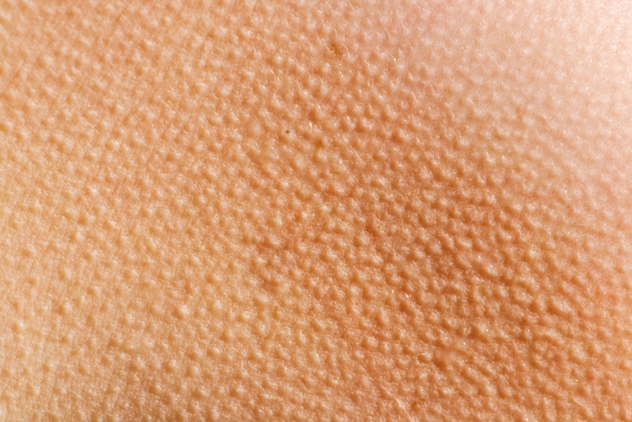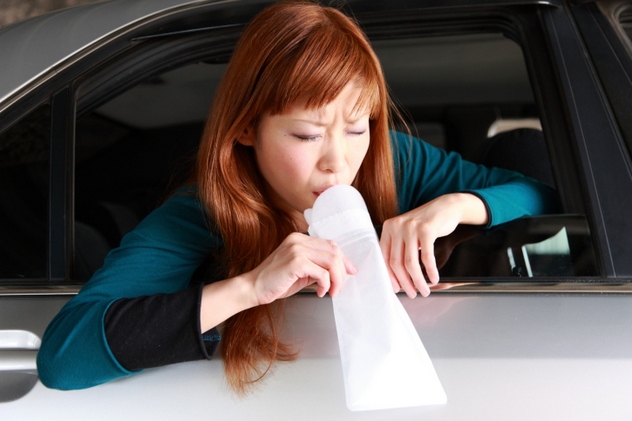5.Phantom Vibration Syndrome
5.震動幻覺綜合征
If you use a smartphone or another electronic device that comes with a vibrate function, you will probably have experienced the "phantom vibration syndrome." Essentially, you feel a vibration in your pocket, take out the phone, and see that your phone is dark. Nothing has happened to cause the device to vibrate, and yet you could clearly feel it.
如果你使用智能手機,或是其他可以震動的電子產(chǎn)品,你可能就體驗過"震動幻覺綜合征"。基本上,你總覺得自己的口袋里有震動,然后掏出手機,卻發(fā)現(xiàn)手機還是黑屏的。沒發(fā)生什么能讓手機震動的事,但是你就是能清楚地感受到震動。
In 2010, a study found that 68 percent of people using such devices experience these phantom vibrations on a regular basis. Possible explanations include the brain misinterpreting other sensory information, such as a slight movement in clothing, as vibration as it anticipates incoming communication through the device.

2010年,一項調(diào)查表明,68%的人在使用這樣的電子產(chǎn)品時會經(jīng)常性地產(chǎn)生震動幻覺。一種可能的解釋是,大腦對感官接收的訊息產(chǎn)生了曲解,就像我們會不經(jīng)意間改變穿著一樣,我們渴望有人給我們打電話,而產(chǎn)生手機震動的幻覺。
4.脊梁骨發(fā)涼

Shivers down the spine, and the goosebumps that traditionally accompany them, happen in all kinds of situations. They usually occur during stressful moments, such as when a person is in danger. This affects the hypothalamus, the section of the brain that controls certain nervous system functions. It releases large amounts of adrenaline to help the body prepare to react to the situation. This causes muscles to contract and hair to stand on end, leading to goosebumps. The same reaction happens when a person feels intense emotions such as love, happiness, or shock. Music causes shivers down the spine because it induces strong emotions in humans, causing the brain to release adrenaline.
脊梁骨發(fā)涼常伴隨著起雞皮疙瘩,在各種情況下都有可能發(fā)生。它們通常出現(xiàn)在壓力大的時候,比如說當(dāng)人處于危險中。它會影響下丘腦的活動,下丘腦是大腦的組成部分,能控制特定的神經(jīng)系統(tǒng)功能。下丘腦會釋放大量的腎上腺激素,時刻為人體對所處情況作出迅速反應(yīng)而準備。它會使肌肉收縮,汗毛豎起,最終起雞皮疙瘩。這樣的反應(yīng)也會出現(xiàn)在人感受到強烈情感沖擊的情況下,像是愛慕、幸福和震驚。音樂有時也讓人脊梁骨發(fā)涼,是因為音樂飽含人類強烈的情感,使大腦釋放出腎上腺素。
3.打哈欠

The act of yawning is so contagious that even reading about it can cause a person to yawn, but there has been much debate over what exactly causes it. One competing theory was that yawning allows the body to take in more oxygen for stressful events that are about to occur, like in sports, to make the body more alert. Other theories suggested that it may be a way to communicate boredom and tiredness and to pump vital fluid around the body.
打哈欠非常容易傳染,即使你讀到關(guān)于哈欠的文字,都可能會導(dǎo)致你打哈欠,針對這其中的原因向來就有不少爭論。一種比較有力的說法是,打哈欠會使人們吸入更多的氧氣,使身體提高警惕,以應(yīng)對即將發(fā)生的壓力事件,比如做運動。其他的理論認為,打哈欠可能是人體表達無聊和疲憊的一種方式,并且可以使體液流動到全身。
In 2014, researchers came up with a new theory that unified many of the contradictory elements of yawning to give a complete explanation. According to the study, yawning is the body's way of attempting to cool down the brain. The yawn takes cold air in and increases blood flow around the brain, carrying away excess heat. This theory also explains why so many situations cause yawning. The brain heats up in stressful situations and before exercise; it also increases in temperature as people grow tired. Yawns fight boredom by allowing the brain to be more alert.
2014年,研究者提出了一套全新的理論,使關(guān)于打哈欠的那些矛盾因素得到統(tǒng)一的解釋。根據(jù)這項研究,打哈欠是人體冷卻大腦的一種方式。打哈欠會使人吸入冷空氣,加強身體的血液流動,同時帶走多余的熱量。這一理論也解釋了為什么有那么多情況都能導(dǎo)致打哈欠。人在面對壓力事件和做運動前,大腦會迅速升溫;人體感到疲憊時,其溫度也會上升。打哈欠的行為會趕走無聊感,使大腦提高警惕。
2.Alcohol-Induced Blackouts
2.酒精引發(fā)的失憶

It is a fairly common occurrence for those who have drunk a large amount of alcohol to be unable to remember parts of a night out (or the entire event). While these blackouts can happen with other drugs, they happen most frequently with alcohol.
很多人在喝了大量的酒后,經(jīng)常會出現(xiàn)不記得昨晚的一部分事情(或者是整件事情)的現(xiàn)象。這種失去記憶的現(xiàn)象,也會由一些藥物引起,但喝醉酒后出現(xiàn)得最頻繁。
Studies have shown that alcohol prevents the brain from being able to transfer short-term memory to long-term memory, essentially stopping people from remembering recent events. This is because alcohol stops receptors in the hippocampus from releasing glutamate. This prevents neurons from being able to communicate with each other normally, blocking the transfer of memory. As such, the person becomes unable to create new memories. The memory can still exist somewhere in the brain, though, which explains why people can be reminded of an event from the previous night and then suddenly remember all about it.
研究表明,酒精會抑制大腦將短期記憶轉(zhuǎn)化成長期記憶的功能,基本上會使人忘記最近發(fā)生的事情。這是因為,酒精能抑制大腦海馬區(qū)的神經(jīng)末梢釋放谷氨酸鹽,阻礙記憶的轉(zhuǎn)換。這樣一來,人體也就無法建立新的記憶。但是,這些記憶還是會在大腦的某個部分儲存著,所以人們會在記起前一晚的一件事情的同時,突然記起所有的事情。
1.暈船

Seasickness, and other types of motion sickness, is a set of symptoms experienced by a large amount of people when they are traveling in vehicles such as ships and cars. The symptoms can include vomiting and dizziness.
暈船,或其他類型的暈動癥,是很多人在搭乘諸如船和汽車等交通工具時出現(xiàn)的一系列不良癥狀。這些癥狀包括嘔吐和頭昏。
It happens because of a disconnect between what a person feels and sees. On a rocking boat, for example, the body senses the motion through the inner ear but cannot see the movement, as the entire boat appears to be still. This causes the brain to receive conflicting information. This triggers a psychological defense mechanism, because the most likely cause of a conflict between the senses are hallucinations brought about by poison. The nausea and vomiting are the body's way of trying to get rid of the toxins it thinks are affecting it.While medication and electronic devices can prevent seasickness, it can also be mitigated by looking at the horizon on a boat or out of the window in a car. This gives the eyes a visual cue to sense the motion, and so the brain doesn't receive confusing information.
這是由于人體的感覺和看到的景象產(chǎn)生了分歧。譬如,在一只搖搖晃晃的船上,人體通過內(nèi)耳道感受到這種晃動,但人眼卻看不到,因為整只船相對于人體是靜止的。這導(dǎo)致大腦接收的信息產(chǎn)生矛盾,人體的心理防衛(wèi)機制便一觸即發(fā),因為最能使信息產(chǎn)生矛盾的東西就是由藥物帶來的幻覺。惡心和嘔吐就是人體想要脫離藥物控制而進行的反抗。暈車藥和電子設(shè)備能夠阻止暈動癥的發(fā)生,在船上觀察遠方的地平線和在車上看向窗戶外,也能減輕暈動病的癥狀。這種方式能使人眼感受到晃動,大腦也就不會接收到矛盾的信息。
















